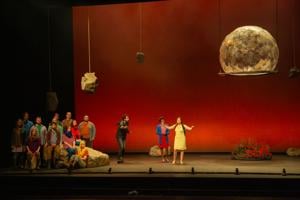“Ruinous Gods” is a mesmerizing work perfect for the Spoleto Festival stage. Its score, by Layale Chaker, is an innovative mix of musical styles, among them old choral chant, and melodies tinged with Middle-Eastern flourishes. The musical aesthetic is contemporary, with its moody tone painting, innovative harmonies and chromaticism, yet it conjures something old, too, for the listener detects hints of medieval intonations, folk song and 18th-century Western lyric opera.
In this way, the music is not unlike the subject matter, new and old at the same time. The opera, a little less than two hours long, with no intermission, is about the emotional impact of forced migration, an unfortunate phenomenon that humankind has known since the dawn of civilization, and which once again has become an acute trauma for many in the world. Here, the topic is examined through the experiences of children afflicted with resignation syndrome, which causes them to slip into a catatonic stupor.

“Ruinous Gods” focuses first on one of these children, compelled to flee her home with her mother, but soon presents several others lost in an underworld purgatory, yet able to communicate freely in their dream state. In the underworld, populated by mythical beings with questionable motives, the children achieve a certain enlightenment, but struggle to escape their condition. One such all-knowing creature, Crow, serves as chaperone, able to exist in both realms.
Yet he, too, is vulnerable to the thre.
















